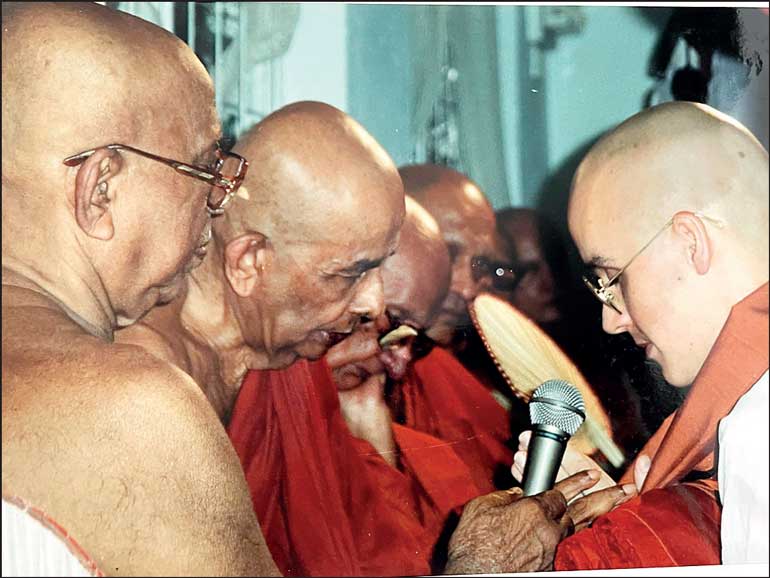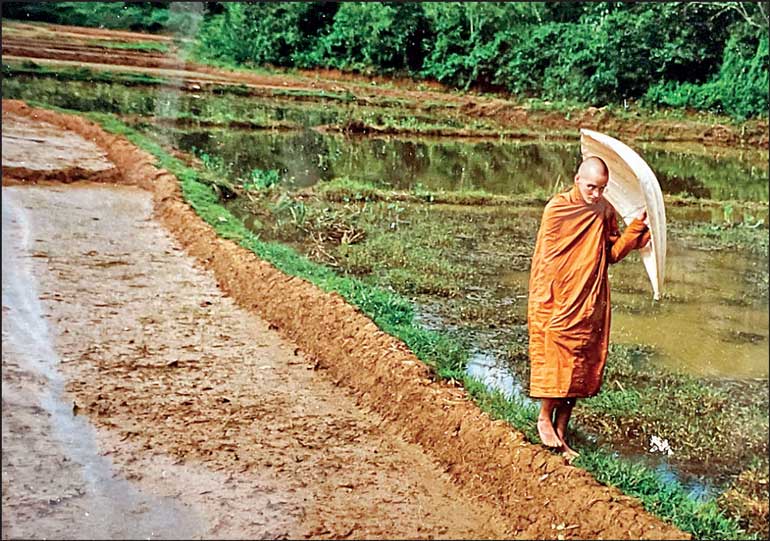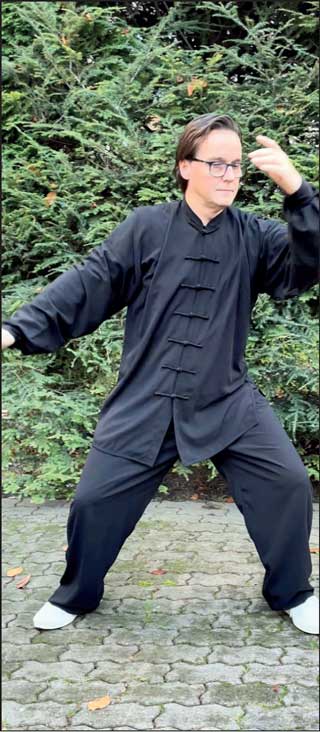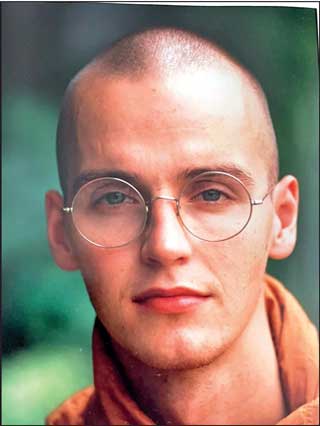Thursday Feb 19, 2026
Thursday Feb 19, 2026
Friday, 6 January 2023 00:00 - - {{hitsCtrl.values.hits}}

Hasse when ordained first

Pindapatha from Forest Monastery
I was taken aback in the first encounter with Hasse Krystad by his fluency in Sinhala language and thereafter his knowledge in Buddhist philosophy, especially the teachings of the Theravada tradition. A handsome young man then in 1999, whom I thought would fit into the role of Norwegian James Bond!
then in 1999, whom I thought would fit into the role of Norwegian James Bond!
The story of Hasse Krystad is worth recording if not probing. A Buddhist university could do qualitative research on him which may reveal where the Theravada tradition stands in Sri Lanka in the eyes of the international spiritual seekers.
The question that troubled me often was why Hasse disrobed. His knowledge on Buddhist philosophy and Tipitaka is remarkable. His discourses were flawless. I invited him to all Vesak and Poya day programs organised by the diplomatic mission in Oslo where he conducted dhamma discourses and meditation sessions as a layman.
He finally revealed his story prior to my departure from Oslo in 2004 which had many grey patches to investigate including why Sri Lanka in modern times has failed to attract foreign visitors for Buddhist related studies and practice. I pen down this note after nearly two decades with consent from Hasse as nothing has improved since then except more fanaticism.
Hasse, as a young lad first moved to “Amaravati” (a Thai Theravada monastery) in England, and followed the teachings in the tradition of Ajahn Cha’s senior Western monks; who had been trained at Wat Pah Nanachat in Thailand. Hasse’s enthusiasm was oozing to learn and practice and see what Buddhist philosophy offers to humanity.
Instead of learning dhamma, he was cleaning, doing chores, attending to seniors, washing clothes, organising ceremonies in the temple, etc. He didn’t mind but was anxious to know when he was going to learn and practice Dhamma. Just completing the first year, and having read Michael Carrithers ‘The Forest Monks of Sri Lanka’, Hasse thought Sri Lanka was a better choice for what he was seeking.
He first ordained with one Nikaya in Colombo, and his ceremony was graced by the erudites in Sasana viz most
 |
| Hasse now - following martial arts under Taoism |
 |
| Hasse as Pemaratana Bikku |
Venerable Piyadassi Thera, Most Ven. Madhie Paññasīha Mahanayaka and Most Ven. Balangoda Ananda Maitreya Thero. He then embarked on the second journey only to realise that his temple was too busy with political visitors, rituals and ceremonies. Hasse once again felt he was going nowhere.
The ‘Sudu-hamoduruwo’ as he was fondly called and unlike a Sri Lankan, has never been taken to a temple by his parents. While his parents were thinking that he might have lost his mind, or that he could be bitten by a snake, get trampled by an elephant, or even get in the line of fire in the war, most of the Buddhist mothers and fathers in Sri Lanka saw him as an ideal son bringing a bagful of merits to be taken to the next life.
Having gained nothing, he decided to leave the Nikaya and join the Sri Lankan forest monk order that he’d read about. He left the Nikaya after some internal entanglements because he wanted to live with the stricter forest monks at the Kalyana Yogashramaya Samsthava order.
He was finally accepted for re-ordination under Kadawadduve Jinavamsa as preceptor, and Nauyane Ariyadhamma as Achariya, and went on to follow the forest traditions; a life supported by Pindapatha and Bhavana.
According to Hasse it’s the poor village people that kept him going. It was a great opportunity for them if a solitary arañya monk came walking by their humble shack and stood there silently for a while. For him to be on the receiving end of such pure devotion, trust and giving – was both humbling and committing’.
He said, “I wasn’t a tourist here. Every day, rain or shine, walking for an hour to a new street, and to new houses on rotation, they never let me down, and I couldn’t let them down either. And besides having to discover the path to freedom offered by the Lord Buddha, I needed to eat.”
He didn’t mind the tough living conditions as long as he felt a progress in his journey. Contrary to his expectations he was once again forced to memorise literature and adhere to strict Theravada orthodoxy where he had no freedom to do his own analysis which is fundamental to Buddha-Dhamma. It was like – out of the frying pan into the fire.
By this time Hasse (then Pemaratana Bhikkhu) had spent nearly three years in Sri Lanka. With mixed and disgruntled feelings, he opted to leave the island with the intention of continuing his search and Dhamma practice in his home country – Norway. The Monk – Hasse was a popular figure in Oslo. Seeing a Norwegian monk wandering around with a begging bowl was a fascinating sight for the Oslo community.
Then came that year’s winter bringing the temperature down to minus 30 degrees in the City. Hasse was lost. No food, no job and no livelihood. Circumstances forced him to revert to civilian life and start working but he continued to share his knowledge in Buddhist philosophy among the interested people including those who were attached to the Norwegian Buddhist Federation. His communications skills in Sinhala language also made him marry a Sinhala lady from Sri Lanka and they had two children.
Hasse would have been a valuable asset to Sri Lanka, had he been given the freedom to continue with the Dhamma search as Pemaratana Bikku. Instead he saw what’s happening on the pretext of protecting Theravada tradition especially how some of the leading monks were gathering wealth and comforts either by getting close to politicians or showing the audience carrot or stick viz heavenly pleasures or pains in hell.
This also opens a question as to what the Buddhist scholars in universities are doing to dispel the fallacies, leave alone the slavery for politics. Amidst all that, Sri Lanka has set records in consumption of alcohol, rape cases and child abuse, suicides, sending out mothers and sisters to countries to be abused as domestic workers, increasing poverty, corruption, and malpractices. The list is long.
Hasse, I believe, made the right decision to continue with his search elsewhere. He stood no chance in Sri Lanka with the complexity in which Theravadaism is exhibited with no adequate supporting evidence for values in practice.
(Dr. Wanigasekera is currently an Academic and was the first Sri Lankan Diplomatic envoy to Norway in 1999.)